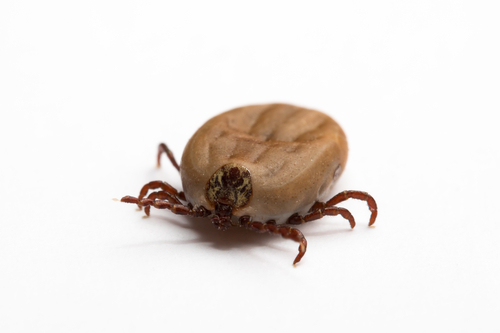 University of Oxford and Monash University scientists have discovered how proteins present in tick saliva prevent the immune system from running amok.
University of Oxford and Monash University scientists have discovered how proteins present in tick saliva prevent the immune system from running amok.
Work published today in Nature Structural and Molecular Biology by a joint team from Oxford University and Australia’s ARC Centre of Excellence in Advanced Molecular Imaging, reveals a connection between an important therapeutic, Eculizumab, and proteins in tick saliva.
Eculizumab, sold under the name Soliris, is currently the only therapeutic available for treating life threatening blood disorders, Paroxysmal nocturnal hemoglobinuria (PNH) and atypical haemolytic-uremic syndrome (aHUS). In these diseases, the immune system attacks and destroys blood cells. Soliris works by shutting down part of our immune system.
When ticks bite an unsuspecting victim they inject substances that inhibit the same part of the immune system that Solaris targets. These substances allow the insect to stay attached and feed on people for up to ten days without the immune system recognising and destroying them. The Oxford and Monash research team set out to understand how these insects can shut down an immune reaction.
The team used a combination of X-ray crystallography and powerful microscopes within the Ramaciotti Centre for Cryo-electron microscopy at Monash University to look into the molecular structures of both the tick proteins and Soliris in complex with the immune proteins they bind.
If you have PNH or aHUS your immune system attacks your blood cells. And the consequences of these diseases are devastating and systemic.
“Soliris is also one of the most expensive drugs in the world, costing up to $500,000 per patient per year,” said Associate Professor Hans Elmlund, Imaging CoE and co-lead author of the paper.
“Using three-dimensional electron microscopy and computer modelling we could determine exactly where Soliris binds and understand how it inhibits this part of the immune system. Knowing this, and knowing how ticks defend themselves will provide novel inhibitors.”
Professor Susan Lea, Oxford University and visiting academic at Monash University explains that the tick proteins are much smaller and easier to make than the antibodies in Soliris and may result in much cheaper therapies for a range of different immune disorders.
“The tick proteins act at the same point in the cascade as Soliris but they differ in molecular detail, and therefore may provide routes to treatment of patients with PNH who have become resistant to Soliris,” said Susan.
She adds: “Blood poisoning, or Sepsis, kills over six million people a year. Affected individuals often die because of a powerful, but ultimately catastrophic, immune over-reaction called ‘cytokine storm’. Our team hope that the tick-related proteins may one day be of use in controlling cytokine storm in order to lessen mortality in conditions such as sepsis.”
Source: Monash University
Filed Under: Drug Discovery



